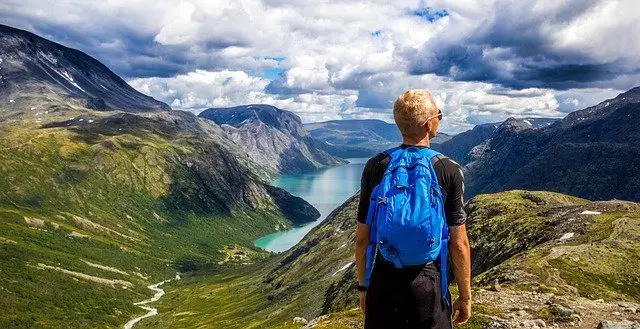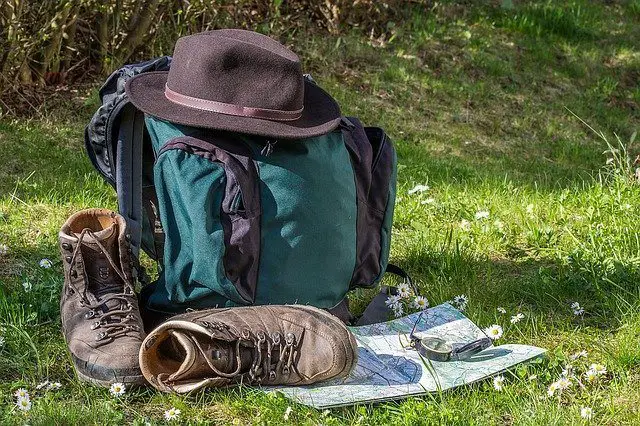What Is Backpacking? (What It Means In 2021)
While backpacking is a form of travel favored by youngsters, the truth is it's an adventure that anyone can enjoy, no matter their age. Staying in inexpensive accommodations and packing everything you need in a single backpack is, after all, quite liberating.
The best part is that you can be much more flexible with your plans with just a backpack in tow. Now is as good a time as any to start planning your next backpacking vacation.
What Does It Mean To Be A Backpacker?
To be a backpacker quite literally means having everything you need in a pack that is carried on your back. While travel has been around as long as mankind, traveling for leisure only took off during the 17th century.
One of the reasons why backpacking is so popular is the cost. Being able to carry all your stuff in a single bag can save money on check-in luggage. Backpackers also save money on hotels because they usually favor more affordable lodgings in a bid to experience local culture on a more intimate level.
Backpacking can be done with a group of friends or solo. Backpacking solo is challenging but still fun and is a great way to meet new people.

Different Types of Backpacking
Spiritual Traveler
Spiritual travelers are people who are fed up with the modern focus on materialism and want to experience the world on a spiritual level. They are perhaps students of Kabbala, Buddhism, or yoga.
They are searching for a more spiritual connection with the world and love to explore local religion and culture. Spiritual travelers usually prefer to backpack solo.
The Hippie
Hippie travelers hate commercialism. They travel around a country using local transportation and eating local food. You can easily spot a hippie backpacker by their clothing: tie-dye t-shirts, beaded hair, and fisherman pants.
Hippies usually avoid popular tourist areas since they are "too commercial." They prefer to travel from place to place by hitching for rides.
Gap Year-ers
This kind of backpacker is young. British, Kiwi, and Aussie kids usually take a break after high school and spend a year traveling outside their native countries before entering university.
They prefer to travel in groups, like to party, and usually stay in youth hostels to save money.
Partygoers
These backpackers spend most of their time partying and drinking. Mornings are usually spent in bed, and hangovers are common.
Partygoers are nocturnal creatures and like to explore bars and experience as many different drinks and cocktails as possible.
Backpacker Couples
Backpacking couples like to go on tours, spend time sightseeing, and do local activities. They can be found around the world and gravitate towards other couples.
Young couples like to explore by day and party by night. Older travelers like shopping and sightseeing.
Digital Nomads
Digital nomads carry their laptops, cameras, and iPads with them, combining their work with travel. You can usually find them in local internet cafes working during the daytime and exploring into the night.
Backpacking Vs. Hiking Vs. Camping: What Are The Differences?
Some people use backpacking, hiking, and camping interchangeably, thinking that they are the same. However, there are a few significant differences.
Backpacking Vs. Hiking
Backpacking typically refers to a vacation where exploring new cultures and experiences is the main focus. Hiking often involves physical activity, such as trekking and exploring the great outdoors.
Both backpackers and hikers usually carry all their gear in a single backpack. However, backpackers tend to travel for longer periods and don't intend to stay in one place for a long time. Hiking backpacks are often designed to carry more equipment at once.
Backpackers explore the wilderness, cities, countries, or anywhere in the world that allows travelers. Hikers can also travel around the world but prioritize exploring hiking trails, outdoors, and nature.
Backpackers Vs. Campers
Backpackers prefer to move from one place or another. They like to explore local culture, food and go sightseeing. Campers prefer to stay rooted in a specific area. They see camping as a way to unplug from society and like the solitude of the wild.
Backpackers travel to one or many destinations and countries during their trip. Campers drive to a campsite and relax.
Backpackers have the option to stay in hotels, hostels, inns, and other forms of accommodations. Campers usually stay in tents, caravans or sleep under the stars. backpackers should consider other things such as theft of bags when moving from city to city.

What To Bring Backpacking: Must-Have Gear Guide
Seasoned backpackers know that it takes a lot of planning and advanced preparation to ensure that your adventure starts on the right footing.
Here are some items you should always have on your backpack.
Traveling For Leisure
Traveling For Outdoors Or Wilderness
How to Become a Backpacker: Tips for Beginners
Backpacking is not just an economical way to explore the world but also a way to experience new things. If you're thinking about backpacking but unsure of how to do so, we have some tips on how you can become a backpacker.
People Also Ask (FAQs)
Is backpacking dangerous?
There will always be dangerous locations but avoiding them is easy. Read blogs, travel guides, and forums to understand where you should and shouldn't travel.
Experience will also have a significant impact on your perception of danger because it affects your reactions. For example, encountering a bear during your backpacking trip is dangerous, but knowing how to act during this situation can make a big difference.
How much water should I carry during backpacking?
It depends on how long you plan to travel. As a general rule, backpackers usually carry 1 liter of water for every 2-hour hike.
You can also opt to carry water filtration and purification devices (like LifeStraw) so that you can safely drink from local water sources or for longer trips and lighter backpacks.
How much does it cost to go backpacking?
Cost depends on the destination and duration. Going abroad will always cost more compared to local adventures. You have to pay for plane tickets, lodgings, and food. The longer you stay, the bigger the bill.
Conclusion
Backpacking is a great way to see and explore nearby destinations and far-flung countries. This cheap travel method attracts young people, empty nesters, and retirees because it makes them feel young, and experiencing new cultures is an enriching activity.
Next time you get the travel itch, consider backpacking. It will not only save you money, but it can also open doors to new experiences and adventures.
